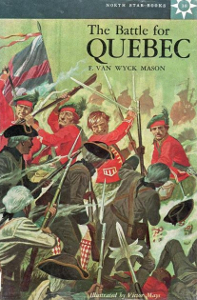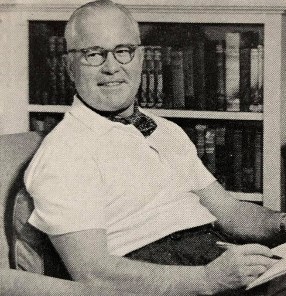The Battle for Quebec

Author:
F. Van Wyck Mason
Illustrator:
Victor Mays
Editor:
Sterling North
Publication:
1965 by Houghton Mifflin Company
Genre:
History, Non-fiction
Series:
North Star Books ![]() Members Only
Members Only
Series Number: 38
Pages:
184
Current state:
This book has been evaluated and information added. It has been read but content considerations may not be complete.
Book Guide
Search for this book used on:
One of the great battles of the world lasted for only ten bloody minutes, but it changed he entire history of North America.
At five minutes to ten on September 13th, 1759, some five thousand British Regulars in crimson coats, Highlanders in colorful tartans and Royal Americans and Rangers faces an equal number of French Regulars in spotless white coats and powdered hair, rough-appearing Canadian Militia and Indians daubed with war paint.
The battlefield was a large farm known as the Plains of Abraham just outside the walls of the great French fortress, Quebec.
General Wolfe, gaunt, pale, mortally ill and incredibly brave, led the English into battle. General Moncalm, proud, able and absolutely fearless, rode his black horse ahead of the French lines. These two, equally gallant commanders drew up their well-matched armies in perfect formation for the classic encounter that would decided the fate of the continent.
For a century these "Ancient Enemies" had been struggling over the great prize in a series of four wars that rocked Europe and the American colonies. And now at the climax of the fourth war, the English with their invasion fleet had besieged French Quebec for nearly three months before attempting the incredibly bold nighttime ascent of the almost vertical cliffs above the St. Lawrence.
Montcalm waved his sword, and the French, uttering wild yells, advanced in three dense columns, six ranks in depth, shooting their muskets from the waist in volley fire. Motionless as statues the British infantry stood where they were, though many fell, dead or wounded, at each volley.
When the French were within forty yards, Wolfe shouted "Present!"
Hundreds of gun barrels rippled down to the horizontal.
"Fire!"
The French were mowed down as though by a scythe. One more such British volley and the battle was all but won as the French began their retreat in wild disorder.
Among 1500 French casualties was the gallant Montcalm, three times wounded, yet fighting to the last. Among the 664 British casualties was the brave Wolfe who despite two previous wounds, now shouted "Charge!" and staggered thirty feet forward before the third ball struck him, mortally, in the chest.
The big clock on the basilica of Quebec pointed its upraised hands at five minutes after ten, and France had lost North America (for the century of struggle was now virtually over.)
You will never forget F. Van Wyck Mason's vivid account of the battle that changed the fate of our continent.
From the dust jacket
We might have become a French-speaking nation if the French, rather than the British, had won the battle for Quebec in 1759
Already the French controlled the St. Lawrence, the Great Lakes and the Mississippi to New Orleans. With their powerful Indian allies they had pinned the British colonies to a thin strip along the Atlantic, and in four ferocious wars had spread terror among frontier families throughout New England and as far south as Virginia. Braddock's great army marching to seize the Forks of the Ohio, where the French had built Fort Duquesne, was all but annihilated earlier in this final French and Indian War. Meanwhile the French controlled almost the entire fur trade of the American continent.
Whether the French could ever have consolidated and successfully colonized their vast holdings could be debated. But in the summer of 1759 everything turned upon the contest for Quebec, made immortal by the outcome of the battle, and the tragic death of the two brave and sensitive commanders.
Wolfe must have guessed his fate, for as his boat led the others taking the British soldiers to the Cove of Foulon, at the base of the cliff which they must climb in darkness, he recited to the officers and men Thomas Gray's "Elegy in a Country Churchyard": . . . the path of glory lead but to the grave."
"Gentlemen," he said, "I would rather have written those lines than take Quebec."
Sterling North
From the book
General Editor
To view an example page please sign in.
Content Guide
Please sign in to access all of the topics associated with this book and view other books with the same topics.
Please sign in to access the locations this book takes place in and view other books in the same location.
Please sign in to access the time periods this book takes place in and view other books in the same time period.
Find This Book
Search for this book used on:




